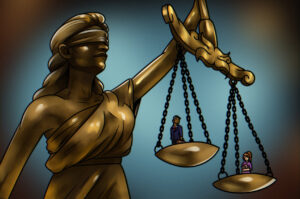You don’t win just for showing up.
“Showing up is half the battle” might be considered an inspirational quote or positive mindset when it comes to hitting the gym, but it doesn’t hit the same way when it’s used in the context of parenting. Being present and going through the motions might have long term benefits when it comes to exercise, but it’s a lot harder to fake engagement when it comes to bonding with children and connecting with each of them on a personal level. Despite this, many parents believe that they get a prize just for showing up and exercising their parenting time without actually putting in work to make it count.
People also tend to believe that the mother will automatically receive more parenting time in family court and the father will be stuck with alternating weekends and shared holidays. However, it cannot be empathized enough that parents do not “win” just for showing up. It doesn’t state anywhere in the Divorce Act (Canada) or the Family Law Act that either parent is a better than the other for being born male or female or for spending more hours around the child. Decisions are made based on what’s best for the child.
The other parent is asking for WHAT?
Parents often panic when they are served with court documents from their children’s other parent asking for all parenting time or shared parenting of their children. It’s important for these distraught parents to remember that their co-parent can ask for whatever they want. Just because someone asks for something doesn’t mean that they will receive it in Court. A parent that requests “sole parenting” or “shared parenting” must sell the idea to the Honourable Court if there is no agreement reached between the parents or guardians.
The other parent said WHAT?
It’s pretty common for people to learn for the very first time about what an awful person or parent they are after being served with court documents. Frequently, parents are appalled to read the accusations that they’re forced to defend themselves against in family court. It’s triggering to read documents that are loaded with insults, part-truths or absolute nonsense.
After being served with court documents, it’s probably a good idea to avoid doing anything that would look bad on paper. It’s a losing battle to prove that someone else lied in court with a wave of unsolicited telephone calls, a flurry of angry text messages or by showing up to see them unannounced to discuss it right then and there. Don’t send a copy of the court documents to everyone you know and don’t post them online for others to see and comment on. Just don’t. People that do things like that end up looking like the “crazy one” that they are played out to be in those court documents.
So, WHO gets the kids?
Anyone with questions on whether their situation meets the criteria for all or most parenting time or decision-making responsibilities (ie, sole custody) must receive this opinion from a lawyer. Lawyers are qualified to make an assessment as it falls into the realm of legal advice.
Lawyers make their assessments, and the Honourable Court makes their decisions based on what’s in best for the child. The factors that are considered are listed at section 16(3) of the Divorce Act (Canada) as follows:
Factors to be considered
(3) In determining the best interests of the child, the court shall consider all factors related to the circumstances of the child, including(a) the child’s needs, given the child’s age and stage of development, such as the child’s need for stability;
(b) the nature and strength of the child’s relationship with each spouse, each of the child’s siblings and grandparents and any other person who plays an important role in the child’s life;
(c) each spouse’s willingness to support the development and maintenance of the child’s relationship with the other spouse;
(d) the history of care of the child;
(e) the child’s views and preferences, giving due weight to the child’s age and maturity, unless they cannot be ascertained;
(f) the child’s cultural, linguistic, religious and spiritual upbringing and heritage, including Indigenous upbringing and heritage;
(g) any plans for the child’s care;
(h) the ability and willingness of each person in respect of whom the order would apply to care for and meet the needs of the child;
(i) the ability and willingness of each person in respect of whom the order would apply to communicate and cooperate, in particular with one another, on matters affecting the child;
(j) any family violence and its impact on, among other things, (i) the ability and willingness of any person who engaged in the family violence to care for and meet the needs of the child, and (ii) the appropriateness of making an order that would require persons in respect of whom the order would apply to cooperate on issues affecting the child; and,
(k) any civil or criminal proceeding, order, condition, or measure that is relevant to the safety, security and well-being of the child.
______
These factors leave room for interpretation. Each family has its own dynamics with its own traditions, strengths and weaknesses. One parent might offer more to the child culturally, but the other parent might have more to offer in other aspects of the child’s upbringing. There is no “one size fits all” approach to deciding which parent is better or who should get the kids. However, the factors are universal. In other words, these factors apply to all parents concerning any of their children. The court will only make child-related decisions after considering what’s best for the children based on those factors.
What should you do with this information?
Not sure what this means or how to apply it to your situation? You must speak with a lawyer for that kind of help. Only lawyers can make an assessment based on the facts because it falls into the realm of legal advice. Parents that can’t get a lawyer for whatever reason can represent themselves. It’s possible to collect information, prepare or respond to documents and talk in a court without a lawyer. It’s just a lot more risky and stressful. Legal services offered by “non-lawyers” are a lifeline that can help self-represented people navigate the process when no other options are available.





